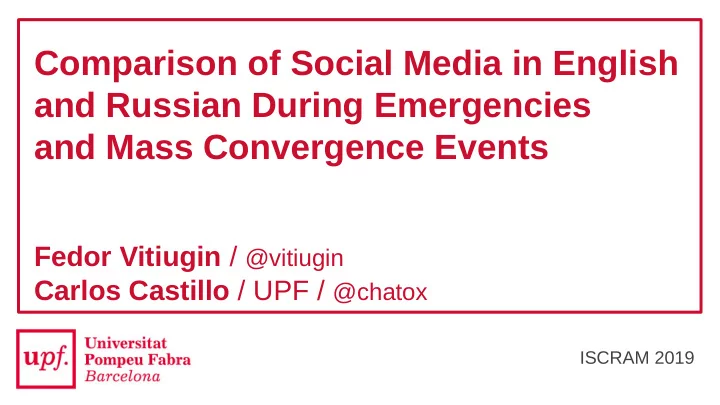

Comparison of Social Media in English and Russian During Emergencies and Mass Convergence Events Fedor Vitiugin / @vitiugin Carlos Castillo / UPF / @chatox ISCRAM 2019
Overview Messages are collected for emergency response or research purposes in a single language. Most previous works considered tweets in English. Anchorage Earthquake 26,691 1,082 Ebeko Volcano Activities 2,595 258 Kerch Poly Massacre 1,267 1,358 2
Our hypothesis We know there are more tweets … but more tweets does not mean necessarily more information We try to quantify how much is gained by doing a multi-language data collection. 3
Objectives ● Create event-driven parallel datasets of events across languages; ● Identify the most significant features for the comparison of tweets across languages; ● Сompare the information and linguistic characteristics of these datasets. 4
Method overview We focus on changes during crisis events (differences-in-differences), which can be very varied but almost invariably leave a large footprint in social media communities. We include not only an analysis of the linguistics characteristics of messages, but also of the informativeness of messages and their sources, and virality. Mendoza, M., Poblete, B., and Castillo, C. (2010). “Twitter Under Crisis: Can we trust what we RT?” In: Proceedings of the first workshop on social media analytics. ACM, pp. 71–79. Tereszkiewicz, A. (2013). “Tweeting the news: a contrastive study of english and german newspaper tweets”. In: kwartalnik neofilologiczny 3. 5
Pipeline of research system Keyword detection by TF-IDF Through TwitterAPI 6
Collected data Number of tweets before filtering Number of tweets after filtering Event Dates English Russian English Russian Natural disasters Anchorage Earthquake 01.12.18 — 03.12.18 36,865 1,263 26,691 1,082 Ebeko Volcano 02.11.18 — 06.11.18 67,000 1,500 2,595 258 Activities Man-made disasters Kerch Poly Massacre 18.10.18 — 20.10.18 1,850 3,350 1,267 1,358 Paris Fuel Riot 24.11.18 — 26.11.18 163,345 2,344 64,385 676 Sports events F1 Race in Sochi 30.09.18 — 04.10.18 333 1,650 102 189 UFC229 Khabib vs 05.10.18 — 07.10.18 650 600 267 190 Connor 7
Results: entities The '*' marks statistics for the Russian messages that differ by more than one standard deviation from the English messages. 8
Results: entities 9
Results: entities 10
More results - Russian-speaking users prefer to share their own impressions, while the number of links in English tweets usually increases. - English-speaking users are more familiar with platform mechanics than Russian-speaking users - Russian-speaking users use Twitter as a real-time platform, to speak about what is happening now. 11
Results: links and citations 12
Results: part of speech Nouns and verbs as informative parts of speech for our purposes (Langacker 1987). The '*' means a different of more than one standard deviation. 13
Results: platform mechanisms The '*' means a different of more than one standard deviation. 14
Results: times and numbers The '*' means a different of more than one standard deviation. 15
Conclusion The analysis of only English (or only Russian) tweets would miss a substantial amount of valuable data that can describe the effects of a crisis — detailed names of locations or new names of relevant persons. Our analysis of named entities allows to capture: ● larger number of locations (in Russian) and organizations (in English), ● more people associated with an event (almost 50% of popular people are exclusive to each language). The analysis of messages in Russian indicates an increase in the information content through a decrease in the use of links and quotations , a simultaneous decrease in the number of verbs and an increase in the number of nouns . An analysis of messages in English language revealed the activation of verified accounts , as well as the use of numbers and time references . 16
Future work: classification CNN + Emb LSTM + Emb SVM RandomForest SGD ExtraTrees English 98.73% 96.32% 90.67% 91.35% 89.40% 91.18% Russian 98.04% 94.08% 89.43% 84.70% 89.05% 90.95% Spanish 98.42% 96.81% 92.70% 92.30% 92.42% 91.54% Deutsch 96.95% 88.44% 89.58% 89.79% 88.85% 88.31% average 98.03% 93.91% 90.60% 89.53% 89.93% 90.50% median 98.42% 96.32% 90.13% 90.57% 89.23% 91.07% 17
Future work: data Number of tweets before filtering Number of tweets after filtering Event Dates English Russian Spanish German English Russian Spanish German Anchorage 27.11.18 — 16,716 1,040 2,055 155 8,834 704 1,253 109 Earthquake 3.12.18 Christchurch 15.03.19 — 504,441 4,877 12,553 20,702 216,955 1,631 4,412 5,228 Massacre 18.03.19 Ethiopia 11.03.19 — 41,774 1,902 7,202 735 26,597 1,314 6,346 567 Aircrush 13.03.19 Paris fuel 24.11.18 — 120,018 1,405 25,088 6,172 13,880 456 6,069 3,791 riots 17.12.18 18
Future work ● Notability of persons ● Location types ● Organization types ● Classifiers for subjectivity ● Opinion vs fact 19
Questions? fedor.vitiugin@gmail.com 20
Recommend
More recommend